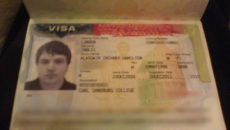Over 4,000 Liberians in the United States received good news when President Donald Trump finally extended their Deferred Enforced Departure status by an additional one year.
Trump issued a memorandum directing the Department of Homeland Security to begin a 12-month wind-down period of DED for Liberians beginning this April.
The memo suggests that Liberians who are currently residing in the U.S. on DED would now have another opportunity to remain until March 2019.
The U.S. Citizens and Immigration Service or USCIS alerted the public that it would also automatically extend employment authorization documents for current Liberian DED beneficiaries who have those documents bearing a March 31, 2018, expiration date. The extension will last until Sept. 30 this year. Â Beneficiaries would, however, be required to reapply for employment authorization for the final six months.
DED beneficiaries, according to the USCIS, are Liberians or stateless individuals who last resided in Liberia that has lived in the U.S. since 2002 to present. Some held another immigration status called Temporary Protective Status up to September 30, 2007, and were subsequently covered by DED.
In his memorandum issued on Tuesday, the U.S. President said through consultation with appropriate executive departments and agencies and his advisors, he had been informed that conditions in Liberia had improved and that the country is no longer experiencing armed conflicts and has made significant progress in restoring stability and democratic governance.
“Liberia has also concluded reconstruction from prior conflicts, which has contributed significantly to an environment that is able to handle adequately the return of its nationals,†he wrote in the memorandum.
The president said although the 2014 outbreak of the Ebola virus caused a tragic loss of life and economic damage to Liberia, the country has made tremendous progress in its ability to diagnose and contain future outbreaks of the disease.
Conditions in Liberia no longer warrant a further extension of DED, he said. However, the president added that the foreign policy interests of the United States warrant affording an orderly transition or “wind-down†period to Liberian DED beneficiaries.
“In consultation with my advisors, I have concluded that a 12‑month wind‑down period is appropriate in order to provide Liberia’s government with time to reintegrate its returning citizens and to allow DED beneficiaries who are not eligible for other forms of immigration relief to make necessary arrangements and to depart the United States,†the memorandum noted.
In 1999, following the end of the first civil war, President Bill Clinton first authorized DED for Liberians, for a one‑year period. Clinton then reauthorized DED for Liberians after he found that the political and economic conditions in Liberia at the time was still not guaranteed.
In 2007, President George Bush directed that DED be extended for 18 months. He further directed the Secretary of Homeland Security to issue procedures for granting work authorization to DED-covered Liberians.
Also, in March 2009, President Barack Obama extended DED for an additional 12 months, which was extended in March 2010, August 2011 and March 2013, for additional 18 months. Obama granted additional 24 months in September of 2013, and the last 18 months in September 2016, as he was preparing to leave office. It is this extension that would have expire this weekend.
Hundreds of Liberians had gathered at the state capitol building in St. Paul, Minnesota to call for President Trump to renew DED on Monday. Some of the immigrants who had been in the U.S. for more than two decades said they had nowhere to live in Liberia.
Minnesota is estimated to have the most Liberian immigrants in the country. Many of them have become citizens and thousands of others on DED have built lives here. Many of them currently work in health care or own businesses, while their children are U.S. citizens.
The Liberian community reportedly received the backing of at least 53 members of the US Congress, calling on Trump to extend the program for Liberian immigrants by additional three years.
According to the Daily Observer, the National Council of Churches of the United States of America also wrote the U.S. government to extend the stay of the Liberian immigrants residing in the U.S. by an additional 18 months.
Featured photo courtesy of Courtney Perry/MPR News



